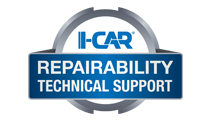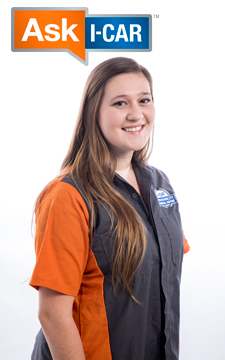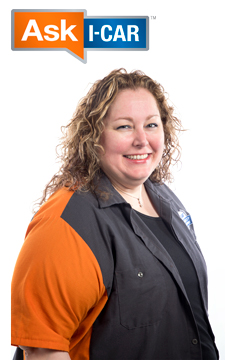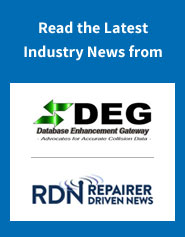I-CAR Repairability Technical Support Portal Connects Industry Pros to OEMs

by Society of Collision Repair Specialists (SCRS)
Prosser, Washington, November 12, 2014 - The Inter-Industry Conference on Auto Collision Repair (I-CAR) continues to promote the launch of its Repairability Technical Support (RTS) Portal, an extensive collection of resources available to help provide repair industry members with valuable information, technical support and repair solutions. Located at rts.i-car.com, the Portal offers real-time OEM information and announcements, collision repair articles, technical questions and answers and much, much more.
Stemming from an initial request to I-CAR from the Society of Collision Repair Specialists (SCRS) and peer groups to establish an entity to address and rectify gaps in OEM repair procedures and processes, the RTS Portal aims to provide a one-stop resource of collision repair information and knowledge. As Jason Bartanen (Director, Industry Technical Relations for I-CAR) tells SCRS, the RTS Portal has been compiled to help foster greater understanding to all members of a rapidly evolving industry. "We are just trying to make sure that all the information is out there to help facilitate complete, safe, quality repairs," he says. "A lot of this information has been available for a number of years, but we've brought everything over to the RTS portal so that it's all in one spot and easily navigable. We've updated and refreshed some of the information with new photos and a revamped look, as well."
Nearly every vehicle manufacturer selling vehicles in America is represented in the "OEM Information" section of the RTS Portal, containing links to manufacturer-specific repair websites, position statements, body repair manual guides, news and available training opportunities. "This is information many of the automakers have asked us to push out to the industry," Bartanen says. "The manufacturer may be connected to their dealer network, but may not always be connected to the insurance and independent repair communities. This provides a way to bridge any information gaps. Additionally, we've gone ahead and recorded ourselves going into each OEM's website to help show repairers how to find the information they're looking for. No two websites are alike, and so it's often difficult to find the specific information you're seeking. We're trying to take out the guesswork and give people the answers they need as quickly as possible."
Repairers will also find repair solutions through the Portal's "Ask I-CAR" feature, which allows the user to search by make, model and year to search for repair questions and answers on a particular vehicle. "If the visitors can't find an answer to the question they have, they can either submit an inquiry online with the click of a button, or they can call our full-time on-staff technical experts," he continues. "Inquiries are forwarded directly to the staff, and, if our experts are unable to answer the call, we have a policy of getting back to the caller in a two-hour window. We may not always have an answer in that timeframe, but we will always get back to them with an update."
Additional features on the Portal include collision repair news updated as published industry-wide with updates announced via X, formerly known as Twitter, (@Ask_ICAR), and an airbag replacement and partial part replacement search. I-CAR is also in the process of adding a hybrid search matrix for additional information and resources on hybrid vehicle disablement, to protect collision industry professionals working on, and around, these vehicles.
As Bartanen says, an invaluable byproduct of the Portal is enhanced communication between repairers and automakers. "Our OEM link pin activity creates an interactive method of sharing information. If someone has a question we can't find an answer to, we can reach out to the manufacturer and then post that resulting information online. Additionally, as we get feedback from our repairers, we can approach the manufacturers and ask them to approach new ideas."
In the same vein of shared communication, the Portal has also facilitated the creation of repairability summits and industry segment advisory councils (ISACs), which feature representation and active participation from manufacturers on a variety of subjects. "We equate these summits to topic-specific focus groups," notes Bartanen, "and they're extremely helpful. For example, on the topic of high-strength steel, we brought in a number of experts and asked, 'What are some of the best practices?' We took that information and actually built a training course around it. We're also holding OEM ISAC meetings, where our OEM contacts come in to talk about overall issues and what we can do better as a group to perform a particular process better. We have been working with industry groups like SCRS, and notify them immediately when information is presented. And they let us know when they have information they'd like us to share. It's all about networking and interaction."
"We're getting feedback from the industry on what gaps need to be closed; it's a great concept, and we've found it to be working really, really well," he adds. "We're really busy and we've got a great team in place. We're excited to see what the future holds, and how we can continue to collaborate to get the best information out there to the industry."
The Repairability Technical Support Portal can be accessed at rts.i-car.com. To learn more about I-CAR, please visit www.i-car.com.
####
About SCRS: Through its direct members and 44 affiliate associations, SCRS is comprised of 6,000 collision repair businesses and 58,500 specialized professionals who work with consumers and insurance companies to repair collision-damaged vehicles. Additional information about SCRS including other news releases is available at the SCRS website: www.scrs.com. You can e-mail SCRS at the following address: info@scrs.com.
Article validated in 2024
-
Toyota/Lexus/Scion Position Statement: Pre- and Post-Repair System Scanning
Thursday, 28 July 2016
As the industry continues to ask if pre- and post-repair system scanning is necessary, Toyota/Lexus/Scion provides their answer.
-
Pre- and Post-Repair System Scanning Statements
Wednesday, 9 January 2019
Are you wondering if a particular OEM or organization has a published statement on pre-repair and post-repair scanning? We have compiled a list of most of the statements on the subject, so you can...
-
ADAS, Calibration, And Scanning Article Hotspot
Monday, 14 January 2019
Since advanced driver assistance systems (ADAS), scanning, and calibration first started becoming relevant, members of the collision repair industry have required as much knowledge as possible on...
-
BMW Position Statement: Pre- and Post-Repair System Scanning - UPDATE
Friday, 10 April 2020
BMW has released a position statement related to pre- and post-repair system scanning. The statement applies to All vehicles equipped with on board diagnostics II (OBD II).
-
Honda/Acura Position Statement: Pre- and Post-Repair System Scanning - UPDATE
Wednesday, 22 May 2019
Honda /Acura has updated their position statement on pre- and post-repair scanning to give more clarification on what is expected for scanning.
-
Quickly Identifying Outer Quarter Panels w/Rolled Hem Flanges
Monday, 5 March 2018
The I-CAR best practice article, Recycled Outer Quarter Panels w/Rolled Hem Flanges has gotten a lot of interest from the collision repair industry. It’s important to know which vehicles are...
-
General Motors Position Statement: Pre- and Post-Repair System Scanning
Friday, 21 October 2016
As the industry continues to ask, are pre- and post-repair scans necessary, General Motors provides their answer.
-
Restraints Wiring Repairs
Monday, 23 May 2016
Over the past few months, we've been sharing OEM position statements on restraints wiring repairs. Now we're bringing them all together in one place for easy reference.
-
FCA/Stellantis Position Statement: Pre- and Post-Repair System Scanning
Thursday, 9 June 2016
FCA/Stellantis has released a position statement related to pre- and post-repair system scanning.
-
Typical Calibration Requirements For Forward Radar Sensors
Wednesday, 12 October 2016
Technicians should be aware of what’s required to keep advanced driver assistance systems (ADAS) running safely after a collision. Whether that be aiming a camera, which can cause a system to not...
-
I-CAR Just In Time: Digital Tram Gauge Basics And Steering Column Measurement Tips
Thursday, 19 February 2026
Sometimes seeing is understanding, that’s why I-CAR's technical team created the Just in Time video series to guide you through a variety of collision repair topics from ADAS and EVs to repair tips...
-
GM Repair Insights: Fall 2025
Tuesday, 17 February 2026
The fall edition of General Motors (GM) Repair Insights magazine is now available.
-
GM Repair Insights: Winter 2026
Tuesday, 17 February 2026
The winter edition of General Motors (GM) Repair Insights magazine is now available.
-
SEMA 2025: Three-Dimensional Measuring Presentations
Thursday, 12 February 2026
I-CAR had numerous presentations at the 2025 SEMA show. Two presentations featured information about three-dimensional measuring of vehicles.
-
Body Repair Manual Symbols: Ford/Lincoln
Wednesday, 11 February 2026
While looking at repair procedures in a body repair manual (BRM) you may notice that symbols are used to indicate specific operations or parts to be used during the repair process. Most BRMs provide a...
-
I-CAR Repairers Realm: I-CAR Registered Apprenticeship Program - Coming Soon
Monday, 9 February 2026
I-CAR is having a discussion on the Registered Apprenticeship Program (RAP).
-
SEMA 2025: Lucid Motors Body Repair Team - The New Gravity SUV
Friday, 6 February 2026
I-CAR had numerous presentations at the 2025 SEMA show. One of these presentations focuses on Lucid Motors Gravity SUV repair information.
-
Calibration Research Tips: Blind Spot Indicator In Side Mirrors
Wednesday, 4 February 2026
While searching for information on advanced driver assistance systems (ADAS) on an OEM repair information site, you may come across unique calibration procedures or events. These events can vary by...
-
Bumper Cover Repair With ADAS: BMW/Mini - UPDATE
Tuesday, 3 February 2026
A simple bumper repair on a modern vehicle may not be as simple as it seems. New technologies like blind spot monitoring, adaptive cruise control, and other advanced driver assistance systems (ADAS)...
-
Hyundai/Genesis Part Replacement Without A Procedure
Thursday, 29 January 2026
We are often asked, “What do I do if there isn’t a procedure to replace a service part?” Let’s see what Hyundai/Genesis says.
- 2026
- February 2026 (9)
- January 2026 (11)
- 2025
- December 2025 (8)
- November 2025 (11)
- October 2025 (13)
- September 2025 (11)
- August 2025 (12)
- July 2025 (11)
- June 2025 (11)
- May 2025 (11)
- April 2025 (13)
- March 2025 (12)
- February 2025 (11)
- January 2025 (12)
- 2024
- December 2024 (8)
- November 2024 (10)
- October 2024 (13)
- September 2024 (10)
- August 2024 (12)
- July 2024 (11)
- June 2024 (9)
- May 2024 (13)
- April 2024 (12)
- March 2024 (12)
- February 2024 (12)
- January 2024 (9)
- 2023
- December 2023 (8)
- November 2023 (12)
- October 2023 (11)
- September 2023 (11)
- August 2023 (12)
- July 2023 (9)
- June 2023 (11)
- May 2023 (12)
- April 2023 (11)
- March 2023 (12)
- February 2023 (10)
- January 2023 (11)
- 2022
- December 2022 (11)
- November 2022 (12)
- October 2022 (11)
- September 2022 (13)
- August 2022 (11)
- July 2022 (10)
- June 2022 (13)
- May 2022 (11)
- April 2022 (12)
- March 2022 (10)
- February 2022 (11)
- January 2022 (13)
- 2021
- December 2021 (13)
- November 2021 (11)
- October 2021 (13)
- September 2021 (14)
- August 2021 (12)
- July 2021 (15)
- June 2021 (17)
- May 2021 (11)
- April 2021 (14)
- March 2021 (20)
- February 2021 (14)
- January 2021 (14)
- 2020
- December 2020 (13)
- November 2020 (17)
- October 2020 (12)
- September 2020 (14)
- August 2020 (11)
- July 2020 (18)
- June 2020 (14)
- May 2020 (14)
- April 2020 (19)
- March 2020 (12)
- February 2020 (13)
- January 2020 (14)
- 2019
- December 2019 (13)
- November 2019 (19)
- October 2019 (25)
- September 2019 (20)
- August 2019 (22)
- July 2019 (23)
- June 2019 (20)
- May 2019 (19)
- April 2019 (20)
- March 2019 (20)
- February 2019 (18)
- January 2019 (17)
- 2018
- December 2018 (18)
- November 2018 (19)
- October 2018 (17)
- September 2018 (16)
- August 2018 (21)
- July 2018 (20)
- June 2018 (21)
- May 2018 (16)
- April 2018 (19)
- March 2018 (21)
- February 2018 (15)
- January 2018 (20)
- 2017
- December 2017 (13)
- November 2017 (15)
- October 2017 (19)
- September 2017 (20)
- August 2017 (19)
- July 2017 (18)
- June 2017 (19)
- May 2017 (18)
- April 2017 (13)
- March 2017 (18)
- February 2017 (10)
- January 2017 (11)
- 2016
- December 2016 (9)
- November 2016 (14)
- October 2016 (21)
- September 2016 (10)
- August 2016 (11)
- July 2016 (8)
- June 2016 (10)
- May 2016 (5)
- April 2016 (11)
- March 2016 (12)
- February 2016 (10)
- January 2016 (8)
- 2015
- December 2015 (9)
- November 2015 (6)
- October 2015 (8)
- September 2015 (7)
- August 2015 (11)
- July 2015 (7)
- June 2015 (5)
- May 2015 (7)
- April 2015 (8)
- March 2015 (8)
- February 2015 (9)
- January 2015 (10)
- 2014
- December 2014 (12)
- November 2014 (7)
- October 2014 (11)
- September 2014 (10)
- August 2014 (9)
- July 2014 (12)
- June 2014 (9)
- May 2014 (12)
- April 2014 (9)
- March 2014 (6)
- February 2014 (1)
- January 2014 (26)










